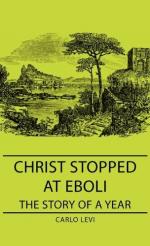|
This section contains 545 words (approx. 2 pages at 400 words per page) |

|
Christ Stopped at Eboli Summary & Study Guide Description
Christ Stopped at Eboli Summary & Study Guide includes comprehensive information and analysis to help you understand the book. This study guide contains the following sections:
This detailed literature summary also contains Topics for Discussion on Christ Stopped at Eboli by Carlo Levi.
Christ Stopped at Eboli, is not, as the title may suggest, about Jesus Christ. It is instead the story of a year (1935-6) that the author, Carlo Levi, spent in a small southern Italian town named Gagliano, which is located in the province of Lucania. Levi is a political prisoner of the Italian Fascist regime and Gagliano is one of the small towns the regime uses as place of exile.
Levi's year is not particularly exciting, and in fact not much happens. One would expect that being the political prisoner of Italian fascism to be a nightmare, but it is not for Levi. Instead, Levi is treated fairly well, and mostly ignored, so long as he stays within a small geographic area.
Fascism, in many ways, is not the subject of the book. It is instead the story of a man of "culture," thoroughly integrated into the thought and culture of the 20th century living in a town that time and civilization forgot. The main theme of the book is Levi's portrait of the townspeople, how they are distinctly and shockingly unmodern, and how they are so ruthlessly oppressed by almost every force around them that they have quietly acquiesced to a continual, unyielding, and cruel fatalism.
One might argue that the point of the book is to expose the 'national greatness' of the Fascist regime. But still, that is not the point. Gagliano's citizens do not hate fascism or resent it; they are largely indifferent to it. They see fascism as just one more political fad in Rome that will have little effect on their lives. Levi notes that they reacted this way to practically any kind of regime. In any case, the citizens of Gagliano see the State itself as alien. This theme is brought out particularly strongly by Levi, who is an anarchist, engaged in Far Left European politics. Yet the book is not often ideological.
The people of Gagliano are forsaken. The title of the book refers to a saying in Gagliano: "Christ stopped short of here, at Eboli." The people of Gagliano regard themselves as being "bypassed by Christianity, by morality, by history itself." They are excluded from human history because they have never been a part of it. The only event that animates the Gaglianoans are the spats of "brigandage" in the mid-19th century, where grassroots Italian brigands fought against the emerging Italian state. The brigands lost, and the Gaglianoans were on the losing side. Only in this war did the Gaglianoans find they had a stake in the outcome because they stood to retain control over their own destiny; they did not even speak of World War I - the brigand wars mattered much more.
Christ Stopped at Eboli then is the story of a people that have not taken part in history and most of it is composed of character sketches and minor plot events. Yet the book as a whole leaves the reader with a sense of a people and a culture radically distinct from our own, shockingly indifferent, stuck in a millennia-old malaise. It is a portrait of the life of the oppressed and powerless, the structure of their world and thought and the ways in which they find meaning.
Read more from the Study Guide
|
This section contains 545 words (approx. 2 pages at 400 words per page) |

|



